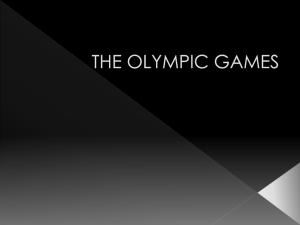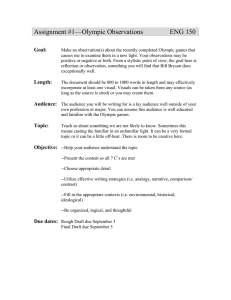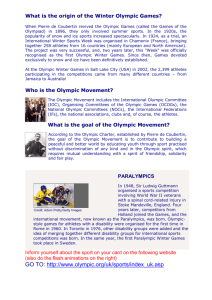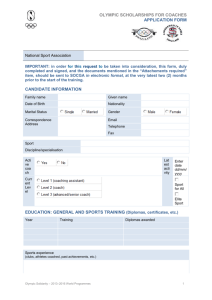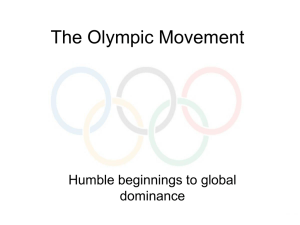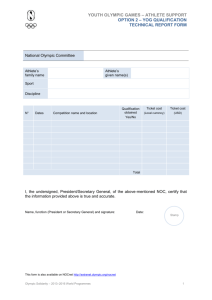Personality’s All-Round Development and the Utopism of Coubertin’s Olympic Idea
advertisement
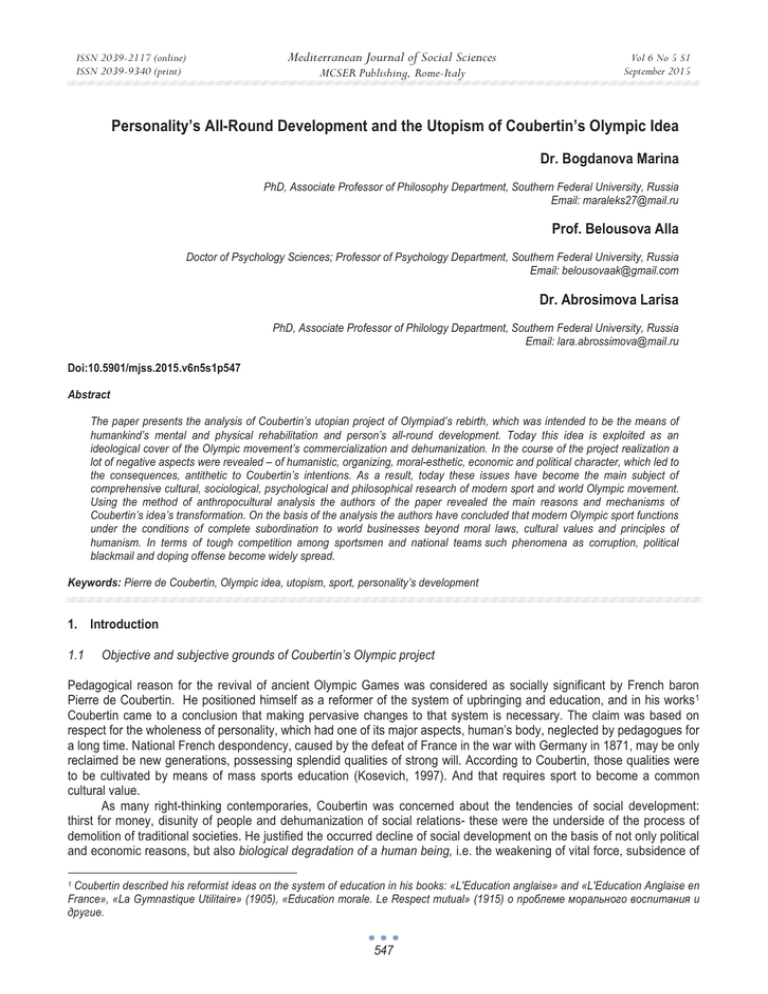
Mediterranean Journal of Social Sciences ISSN 2039-2117 (online) ISSN 2039-9340 (print) MCSER Publishing, Rome-Italy Vol 6 No 5 S1 September 2015 Personality’s All-Round Development and the Utopism of Coubertin’s Olympic Idea Dr. Bogdanova Marina PhD, Associate Professor of Philosophy Department, Southern Federal University, Russia Email: maraleks27@mail.ru Prof. Belousova Alla Doctor of Psychology Sciences; Professor of Psychology Department, Southern Federal University, Russia Email: belousovaak@gmail.com Dr. Abrosimova Larisa PhD, Associate Professor of Philology Department, Southern Federal University, Russia Email: lara.abrossimova@mail.ru Doi:10.5901/mjss.2015.v6n5s1p547 Abstract The paper presents the analysis of Coubertin’s utopian project of Olympiad’s rebirth, which was intended to be the means of humankind’s mental and physical rehabilitation and person’s all-round development. Today this idea is exploited as an ideological cover of the Olympic movement’s commercialization and dehumanization. In the course of the project realization a lot of negative aspects were revealed – of humanistic, organizing, moral-esthetic, economic and political character, which led to the consequences, antithetic to Coubertin’s intentions. As a result, today these issues have become the main subject of comprehensive cultural, sociological, psychological and philosophical research of modern sport and world Olympic movement. Using the method of anthropocultural analysis the authors of the paper revealed the main reasons and mechanisms of Coubertin’s idea’s transformation. On the basis of the analysis the authors have concluded that modern Olympic sport functions under the conditions of complete subordination to world businesses beyond moral laws, cultural values and principles of humanism. In terms of tough competition among sportsmen and national teams such phenomena as corruption, political blackmail and doping offense become widely spread. Keywords: Pierre de Coubertin, Olympic idea, utopism, sport, personality’s development 1. Introduction 1.1 Objective and subjective grounds of Coubertin’s Olympic project Pedagogical reason for the revival of ancient Olympic Games was considered as socially significant by French baron Pierre de Coubertin. He positioned himself as a reformer of the system of upbringing and education, and in his works1 Coubertin came to a conclusion that making pervasive changes to that system is necessary. The claim was based on respect for the wholeness of personality, which had one of its major aspects, human’s body, neglected by pedagogues for a long time. National French despondency, caused by the defeat of France in the war with Germany in 1871, may be only reclaimed be new generations, possessing splendid qualities of strong will. According to Coubertin, those qualities were to be cultivated by means of mass sports education (Kosevich, 1997). And that requires sport to become a common cultural value. As many right-thinking contemporaries, Coubertin was concerned about the tendencies of social development: thirst for money, disunity of people and dehumanization of social relations- these were the underside of the process of demolition of traditional societies. He justified the occurred decline of social development on the basis of not only political and economic reasons, but also biological degradation of a human being, i.e. the weakening of vital force, subsidence of Coubertin described his reformist ideas on the system of education in his books: «L'Education anglaise» and «L'Education Anglaise en France», «La Gymnastique Utilitaire» (1905), «Education morale. Le Respect mutual» (1915) ɨ ɩɪɨɛɥɟɦɟ ɦɨɪɚɥɶɧɨɝɨ ɜɨɫɩɢɬɚɧɢɹ ɢ ɞɪɭɝɢɟ. 1 547 ISSN 2039-2117 (online) ISSN 2039-9340 (print) Mediterranean Journal of Social Sciences MCSER Publishing, Rome-Italy Vol 6 No 5 S1 September 2015 will, impairment of public health and also inability of political leaders to propose effective solutions of social problems. But in contrast to Karl Marx and Friedrich Engels, who associated the improving of living conditions with the basic change of social and economic structure, Coubertin put a considerable accent upon education. He positively knew that the revival of the Olympic Games besides recouping the degenerative displays in contemporary society would contribute to the establishment of new forms of life, expected to be higher in moral and physical terms: “It is his opinion that a man, who trains his “physical muscles”, develops his “moral musculature” as well, gaining physical and moral merits, such as energy, endurance and battle readiness along with physical properties of flexibility, dexterity, power and strength” (Franke, 2006, p. 70). The publication of the results of Olimpia excavations, undertaken by Berlin professor Ernst Curtius, determined Coubertin to the revival of ancient Olympic Games. These excavations, to which German Reichstag allocated significant funds, resulted in not only unveiling of many works of sculpture, parts of buildings and inscriptions, essential in terms of History and Linguistics, but also arousing a great interest for the Olympic contests. In the book “The beauty of Sport” Bernard Law quoted Coubertin’s reasoning, written in his “Olympic Memories”: “The pith of the matter is to reestablish the permanent union of muscles and intellect, which we now find dissolved. I am sure that the union was once productive, but as soon as they grew apart under the influence of adverse conditions, they gradually came to a total mutual indifference, the parting turned to a reciprocal oblivion. However, Olympia, which was their main residence in the past, is now reconstructed, and, to put it more precisely, regenerated and renovated. It is fair to say that the forms of Olympism are new and different now, but they are full of the same vitality and matter. Hence, they can return to their residence, but it is only us, who have to prepare this return first” (Law, 1984, p.62). After having enlisted the financial and political support of his wealthy friends, the Baron used to urge, to convince, to lecture. His administrative temperance and pragmatism on the one hand went amazingly well with romantic belief in success and reckless abandon on the other hand. It was a hard work: there were no standards, laws and terms of holding the Games, the financial and political arguments emerged overall. Nevertheless, he managed to forward his ambitious project after all, also due to the subtle use of the “odour” of antiquity. As Thomas Alkemeyer puts it: “The Anachronism of the Olympic Games themselves became a complementary factor of affinity,” (Alkemeyer 2009, p. 104). The aim of this paper is to analyze the set of sociocultural prerequisites of the appearance of Coubertin’s Olympic project, its main ideals and principles, as well as its role in the formation of modern sport as an anthropocultural phenomenon. The general methodological background of the research is represented by the principle of humanism, which allows assessing both Coubertin’s Olympic project and modern state of Olympic sport and its prospects as the factors of man’s nature perfection in the unity of its mental and corporal essence. Such approach helps to reveal the reasons and mechanisms of the Olympic idea transformation, the distortion of its axiological and humanistic value. 1.2 The main principles and ideals of Coubertin’s Olympism Pierre de Coubertin knew about the impossibility of the ancient Games sense being revived in modern historical conditions, so he reasoned of connecting the ritual of Greek Olympism with liberal idea, with English athletics, based on personal achievement and emulative spirit. In the main principles and ideals of Coubertin’s Olympism, such as mutual understanding and friendship, free will and peace, nondiscrimination on racial, religious or political grounds, the competitive spirit among individuals and teams, but not countries, principles of fair play and the authority of the arbitrator, the appropriate fundamental values of liberal worldview are found easily. Thomas Arnold, the head of the college of Rugby and the author of the idea of “Muscular Christianity”, became Pierre de Coubertin’s spiritual idol. When Arnold took over the business of the College, he had to face serious moral problems, widespread among its students, like inebriety and crimes of all kinds, the tyranny of the elders, total sloth, falsehood and misconduct. In fact, he managed to solve many problems by means of holding regular sport competitions, based on the principles of fair play. He brought in monitoring the play grounds and put an end to a random character of contests, and the organization and arbitrage of matches were laid on the students, who were held in respect among others. As the consequence, the spirit of sport in the College of Rugby became a model to follow all over England. While forming “modern religion”, which would provide new guidance to disappointed people and stimulate their moral and physical rehabilitation, Pierre de Coubertin found its preimage in competitive sports, originated in England. Neither Swedish, nor German gymnastic systems didn’t meet such requirements, because, firstly they didn’t enable comparing achievements in sport outright, secondly they didn’t satisfy emotional needs in leisure and entertainment, which appeared in urban lifestyle, and thirdly new labour management and combat training demanded the formation of the human type, possessing various physical abilities. According to Coubertin, it was the English competitive sport, that 548 ISSN 2039-2117 (online) ISSN 2039-9340 (print) Mediterranean Journal of Social Sciences MCSER Publishing, Rome-Italy Vol 6 No 5 S1 September 2015 combined personal values and esprit de corps in a great way, made a man ready for constant struggle, hardened him in mental and physical terms, acquainted him with moral values and filled his life with rich emotional substance and optimism. Pierre de Coubertin expounded his conception of International Olympism in the lecture, which he delivered at the Sorbonne on November, 25, 1892 on the occasion of celebrating the fifth anniversary of the formation of French Athletic Union. Then, as the Head of the Union, he made an official proposal for the renewal of the Olympic Games: “Let us send oarsmen, fencers and runners abroad, thereby beginning free sportsmen movement, which will stimulate the infusion of the idea of Peace into old Europe’s circulation. Enjoying your support, I am permitted to make a proposal for the renewal of the Olympic Games, reformed so as to meet the requirements of the present” (Kuhn, 1982, p. 227). Consequently, the main Coubertin’s idea, connected with the revival of the Olympic Games, was by no means a simple stimulating the interest in sport and its international developing. First of all, the point was to use sport as a means of solving broad social problems consistently, systematically and efficiently. The matter concerned the value of sport to the “regenerating humanity by way of education”. It also must be emphasized that growing egalitarian tendencies and the professionalism in sports displeased Coubertin, who expected the revived Olympic Games to become an example of “genuine sport”. 2. Findings and Discussion Let’s define some of the basic items of Coubertin’s Olympism, each of which is naturally connected to both the goal of his pedagogical system with the appropriate ideal of personality and the whole prior period of sport system development. After such items (principles) have been defined, the inconsistency and idealism of Coubertin’s theory and his incapacity to put it into practice will become clear (Bogdanova, 2013). So, the principles of Coubertin's project are: 2.1 The formation of a perfect personality, harmoniously combining physical and moral virtues. The goal of teaching, focused on the realization of the ideal personality, is a significant part of the structure of education. The purpose of educational work has a great influence upon its matter, forms, means and methods. Therefore, Pierre de Coubertin in his pedagogical system placed high emphasis on the characteristic of the ideal personality, which is to serve as the purpose of educational work in the Olympic movement. To form his ideal Coubertin referred to the principles of antique Kalos kagathos. According to it, such personality had to possess not only perfect physical properties like health, the beauty (“poetry”) of a physically fit body and motions, but also strength of mind, intellect, aesthetic sense, artistic talent, standards of speech and communication and highly moral virtues as honesty, generosity and unselfishness, which can be generated by the Olympic Sports. However, in the second half of the 20th century the utopianism of Coubertin’s theory of an ideal personality became obvious; the Olympic movement involved various strata of society, and some of them tended to regard sport as social Elevator and the only mean to improve their positions. The ones, who have risen from the bottom of society, bore little resemblance to kalos kagathos personality. While training his body, a young man from a lower class did not care much about developing his aesthetic sense and artistic bent, and a strict sponsorship contract did not combine with high moral virtues, such as honesty, generosity and unselfishness. By the way, all the attempts of generating “an ideal human”, who would perfectly combine sovereign virtues, always landed up in failure. 2.2 Wrestling, aimed at victory over oneself rather than an opponent, is a means of forming an ideal personality. “The be-all and end-all of life is struggle, and not victory. The point is not to win, but to struggle doughtily. By developing these principles we will generate courageous, prepotent, conscientious and noble society”- Pierre de Coubertin said (Coubertin, 1909, ɪ.19). It was claimed by Coubertin, that a sportsman was not to strive for victory at any cost. He was to hold the opinion that the particular result (points, seconds or meters) was not as important as courage and bravery, showed at struggle, and the spirit of struggle itself, which motivates a person to get over himself, his weakness and flaws, were. Opponents’ striving to show their abilities at a noble battle stimulates all of them to move towards perfection. But as soon as the Olympic Games achieved global dominance and high international character, the production of new athletic performance became as natural as the production of new goods, knowledge, equipment and pleasures. More and more the Olympic Sports had been losing their absolute values, and the technocratism became established. 549 ISSN 2039-2117 (online) ISSN 2039-9340 (print) Mediterranean Journal of Social Sciences MCSER Publishing, Rome-Italy Vol 6 No 5 S1 September 2015 “Moving towards abstract perfection fades away from Coubertin’s Olympism and gives way to striving for a specific goal, expressed in points, seconds and winnings” (Bogdanova, 2003, p. 94). 2.3 The spirit of chivalry is a significant principle of the Olympism. There is a defined limit in the Olympic sports, prohibited to outpass, no matter how desired the victory and establishing the record are. Such limit was associated by Coubertin with the principles in the manner of the ethic of chivalry. Only under the condition of moral behavior during a competition, sport and sport contests will not degenerate into a banal punchfest, but fulfill their educational function. Dishonourable competition, susceptible of deliberate breaking of ethical standards and adopted rules of wrestling for the sake of victory, would not let the competitors show their abilities in full. Coubertin thought, that it was obviously possible to come off best in a competition, but then moving towards perfection would be excluded, and that makes sport deprived of its original noble purport. According to Pierre de Coubertin, the main idea of the Olympic Games organization lies in respect to the competitor, treating him like a game partner and not like an opponent or even enemy: “I dare not treat my opponent like a “real, deadly enemy”, but I am obliged to consider him as a comrade and a game partner” (Lenk, 2004). The logic of contemporary Olympic movement development resulted in the idea of fair play as a fair competition being changed. The old aristocratic idea of “gentlemen’s sport”, supported by Coubertin, gave way to formal rules, observed only if necessary. This is a foregone conclusion of social activity: sport is not isolated from other social scenes, which are generally oriented towards purely pragmatic, economic and technocratic values instead of humanistic and moral ones; scenes, in which the tendency to achieving success at any cost dominates. Nowadays the reality is that the victory in modern sport provides significant lucre, impossible to refuse, not only for an athlete himself, but also for a coach, a club and an organization. The Olympic winners’ fees are considerable in every country, and they vary according to traditions, bureaucratic procedures, financial liberty, sponsors’ enthusiasm and the Olympic perspectives. Hans Lenk mentions: “By swinging between the increased demands for indispensable success and noble ideals of fair play, a loyal figure does not achieve his goal, and besides that he draws ridicule for being a naïve person, an incorrigible idealist, a dilettante, a fool etc.” (Lenk, 2004). 2.4 Amateur sport, sport for pleasure and not for money, is considered to be the only area of the Olympic sport. Since every sport activity is focused on developing sportsmen’s abilities and personalities, all the goals, means, methods and forms of organization and holding the workouts, which may damage their moral, physical and mental health, are to be excluded from the field of sport. And here comes the demand for excluding the exploitation of a sportsman by society, nation, businessmen, and the necessity for separating professional and amateur sport. Sport activities are to achieve the only result: moving towards the perfection of spirit and body; using sport activities for achieving any unsporting goals is inconsonant to the principles of Olympism. Moreover, Coubertin mentioned that only unengaged amateur sportsmen, who did not come under the influence of material interest, were able to contribute to the development of friendly sport contacts among different countries. It is a matter of fact, that the principles of Coubertin’s Olympic Charter, in spite of all its humanism, did not meet the democratic processes, because the existing definition of amateurishness created absolute obstacles to the sportsmen of the lower-income strata. And thereby only those, who came from the well-off, could be found “pure Olympians”, or “perfect amateurs”. The long period of debate about the matter and state of amateurishness and professionalism in sport had started, and it was over only 100 years later after the first speeches on this topic had been made. The criterion of financial disinterest and amateurishness quite soon showed its inconsistence in the conditions of society, based upon business and rational account. The logic of the Olympic movement development displayed that the orientation toward crowning achievements could be realized only under condition of absolute concentration on sports activities. But not everybody was able to afford daily wearisome workouts at leisure, because too much time, money and physical strain was to be spent. Consequently, the conclusion was drawn that it was necessary to provide those ones, who were capable of achieving much success in sports, with financial and legislative support and recovery programs, to offset their costs etc. The idea of amateurishness was also discredited by the fact, that modern Olympic movement of a forethought scale could be developed only with the assistance of “powerful force”, possessing large property and political weight in society, able of undertaking the organization of the Olympic movement at the local level and counting on the usage of the “resources” of sports stars. 550 ISSN 2039-2117 (online) ISSN 2039-9340 (print) Mediterranean Journal of Social Sciences MCSER Publishing, Rome-Italy Vol 6 No 5 S1 September 2015 The concept of amateurishness became outdated; it lost its historical implication. The evidence of that is found in the legislative base auditing, conducted by International Olympic Committee: in 1974 the term “amateur” was excluded from IOC documents, and since 1984 professional sportsmen have got free access to the Olympic Games. The Olympic Games managed to do without the support of world business almost for half a century. The money was found due to personal contacts and friendly relations of Pierre de Coubertin and his followers. The costs of holding the Games increased many times over, and ever less countries wanted to host this wasteful event, which yielded the loss of many millions. IOC, under the guidance of Juan Antonio Samaranch, was to “admit” business into the Olympic Games and then become a part of business itself to save the Olympic movement. The Games had turned into a part of global economics, and nothing remained of Coubertin’s Olympism but romantic outer shell. “The Olympic Games have changed into such a large-scale competition, that the Olympic ideal, which brought them forth, is in many respects consigned to oblivion” (Leiper 1998, p.106). 2.5 Olympism is nothing else than “satisfaction over training, culture and the beauty of muscles, work for the sake of the family and society…inseparable unity of all these elements”. In Coubertin’s opinion active sports are not to result in lop-sided and abnormal development of an Olympic athlete. A sportsman has to combine physical perfection and considerable moral culture in a harmonic way. In the combination of sport and art he saw an important term of solving the educational problems of the Olympic movement, one of the main means of a personality’s balanced development and bridging the gap between physical and moral development, which is getting wide. The union of sport and art can also serve as a significant means of enhancing the prestige of sport, which was not high enough at that time, and what is more, “ennobling” it, i.e. improving its cultural value. For this purpose the Olympic Games, held once in four years, were to include art contests of many kinds. Pierre de Coubertin considered them to be the contests of pieces of architecture and sculpture, painting, music and literature, but not only art sports. Coubertin expected the culture to gradually become a part of the Olympic Games, like it was in Ancient Greece. The organization of five contests was intended, which would demonstrate the pieces of architecture and sculpture, painting, music and literature, created under the influence of sport and representing the high ideals of the Olympism. To set the example for art workers, Coubertin presented his “Ode to Sport” under the pseudonym at the art contest of the V Olympic Games, which won the gold medal; however, his undertaking raised only a lukewarm support of public. Despite all Coubertin’s efforts, art and literature have not become the “equal partners” of sport in modern Olympism. The integration of art and literature into the program of the Olympic Games was actually reflected only in the organization of the Olympic Games opening and closing ceremonies, turning them into show. 2.6 “Olympism is the means of consolidating peace among nations and displaying goodwill” (Kuhn, 1982, p.229). Pierre de Coubertin considered the Olympic Games as the means of solving the problems of world politics. As it was in remote Antiquity, the sacred truce is to save the world from war, at least for a while. Sport, developed on both national and international scale, may become a universal means of bridging and better understanding among people, it has all the possibilities to encourage the cessation of argument and controversy and overcoming nationalistic, racial and ideological prejudices. From the very beginning the Olympic movement became the means and arena of tough political, nationalistic and ideological struggle. Quite often the principles of Olympism were broken by the demonstration of racism: the organization of the “days of anthropology” for coloured sportsmen in St Louis, banning Jewish sportsmen in Berlin. The Olympic Games in Moscow were boycotted by more than thirty countries in reply to Soviet invasion of Afghanistan, and in four years the countries of Socialist camp boycotted the Olympic Games in Los-Angeles. Moreover, it became difficult to uphold another principle of Coubertin’s Olympism - the principle of sportsmen and not the countries, competing with one another. 3. Concluding Remarks The development of new European culture in terms of its economy, politics and ideology resulted in the realization of “Pierre de Coubertin’s Olympic project”, which was intended by him as the means of moral and physical perfection of humanity, the mechanism of composing the new political elite, willing to create greater forms of life, and the method of global cultural unite of nations. But, like any utopia, especially of such a wide range, the realization of this project went not 551 ISSN 2039-2117 (online) ISSN 2039-9340 (print) Mediterranean Journal of Social Sciences MCSER Publishing, Rome-Italy Vol 6 No 5 S1 September 2015 the way that Coubertin expected it to go. In the era of advanced capitalism, when money means everything and becomes the purpose of general activity, existence and life on the whole, other social institutes turn out to be the means of raising it. Moreover, this involves their subjection to the principles of lucre and profitability instead of the moral ones. The victory by any means, even the most dishonest ones, turns into the usual goal. Therefore, in the XX century the project of Pierre de Coubertin ran the gauntlet of criticism as the “aggregation of coarse and purely pretentious ideas” (Mikhailin, 2006, p.24). References Alkemeyer T. (2009) Slim and firm: political history of physical culture. In: Philosophy, politics and culture of sport // Logos, ʋ 6 (73). Bogdanova M.A. (2013) Institute of sport: sociocultural dynamics: monography. – Rostov-on-Don: Southern Federal University. Coubertin P. de. (1905) L'Education des adolescents au XXe siecle. I.: L'Education physique: La Gymnastique Utilitaire. Sauvetage Defense -Locomotion. - Paris: Felix Alcan. - 154 p. Coubertin P. de. (1901) Notes sur l'Education publique. Paris, Hachette.- 320 p. Coubertin P. de. (1909) Une Campagne de vingt-et-un-ans (1887-1908). Paris, Librairie de l'Education physique. - 220 p. Coubertin Pierre de. (1915) L'Education des adolescents au XXe siècle. Education morale. Le Respect mutual. Paris, Alcan. - 104 p. Coubertin Pierrre de. (1887) L'Education anglaise // La Reforme Sociale, 7e annee, 2e serie, tome III, let juin. pp. 633-648. Coubertin Pierrre de. (1889) Lettre aux Presidents des Societes d'aviron de Paris et de la province // L'Education Anglaise en France. Paris, Hachette. – 203 p. Franke E. (2006) Modern sport – religion at the turn of the millennium? In: Otechestvennye zapiski. ʋ 33 (6). Kosevich E. (1997) Birth of Coubertin’s Idea. In: Sport, spiritual values, culture. Vol.1. Historical and methodology-theoretic foundations. M.: Humanitarian Centre “SpArt” RSAPC. Kuhn L. (1982) General history of physical culture and sport / Transl. fr. Hungarian. - Ɇoscow: Rainbow. Law ȼ. (1984) Beauty of Sport: Interdisciplinary Study. - Ɇoscow: Rainbow. Leiper Zh. (1998) Olympic Ideal – is it still the philosophical basis of the Olympic Games? In: Sport, spiritual values, culture. Vol.2. Humanistic ideals, Olympism ideas and the world of modern sport. M.: Humanitarian Centre “SpArt” RSAPC. Lenk Kh. (2004) Sport Ethic as a fair play culture. In: Emergency ration. ʋ 3 (35) [Online] Available: http://magazines.russ.ru/nz/ 2004/35/lenk21-pr.html). Mikhailin V. (2006). Citissime, Altissimo, Fortissimo. Some episodes fron the history of competing athletics. In: Otechestvennye zapiski. ʋ3 (6). Olympic Incomes (2014) [Online] Available: http://www.vedomosti.ru/special/incomes-sportsmens-2014.shtml#expand. 552
